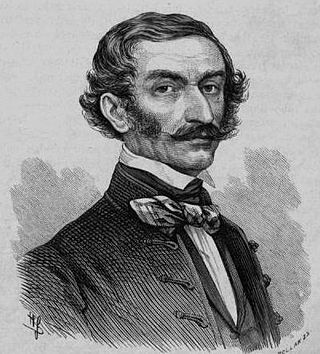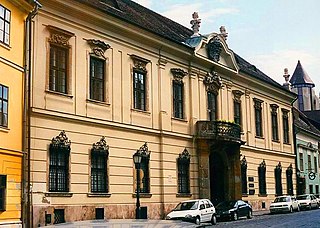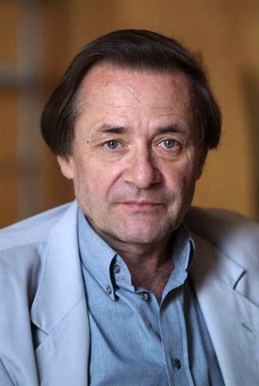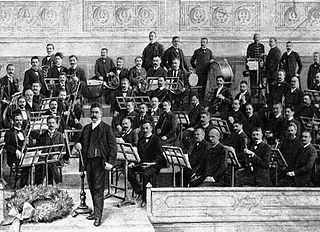
István Kertész was a Hungarian orchestral and operatic conductor who throughout his brief career led many of the world's great orchestras, including the Cleveland, Chicago, Philadelphia, New York, Los Angeles, Pittsburgh, Detroit, San Francisco and Minnesota Orchestras in the United States, as well as the London Symphony, Vienna Philharmonic, Berlin Philharmonic, Royal Concertgebouw Orchestra, Israel Philharmonic, and L'Orchestre de la Suisse Romande. His orchestral repertoire numbered over 450 works from all periods, and was matched by a repertoire of some sixty operas ranging from Mozart, Verdi, Puccini and Wagner to the more contemporary Prokofiev, Bartók, Britten, Kodály, Poulenc and Janáček. Kertész was part of a musical tradition that produced fellow Hungarian conductors Fritz Reiner, Antal Doráti, János Ferencsik, Eugene Ormandy, George Szell, János Fürst, Peter Erős, Ferenc Fricsay, and Georg Solti.
The Hungarian Rhapsodies, S.244, R.106, are a set of 19 piano pieces based on Hungarian folk themes, composed by Franz Liszt during 1846–1853, and later in 1882 and 1885. Liszt also arranged versions for orchestra, piano duet and piano trio.

Karl Klindworth was a German composer, virtuoso pianist, conductor, violinist and music publisher. He was one of Franz Liszt's pupils and later one of his closest disciples and friends, being also on friendly terms with composer Richard Wagner, of whom he was an admirer. He was highly praised by fellow musicians, including Wagner himself and Edward Dannreuther. Among his pupils were Hans von Bülow, Georgy Catoire, and Ethelbert Nevin.

Márk Rózsavölgyi was a Hungarian composer and violinist. He has been called "the father of csárdás".

Ernst von Dohnányi was a Hungarian composer, pianist and conductor. He used the German form of his name on most published compositions.

The Hungarian State Opera House is a historic opera house located in central Budapest, on Andrássy avenue. Originally known as the Hungarian Royal Opera House, it was designed by Miklós Ybl, a major figure of 19th-century Hungarian architecture. Construction began in 1875, funded by the city of Budapest and by Emperor Franz Joseph I of Austria-Hungary, and the new house opened to the public on the 27 September 1884. Before the closure of the "Népszínház" in Budapest, it was the third largest opera building in the city; today it is the second largest opera house in Budapest and in Hungary.

Budapest has long been an important part of the music of Hungary. Its music history has included the composers Franz Liszt, Ernő Dohnányi, Zoltán Kodály and Béla Bartók and the opera composer Ferenc Erkel.

Ferenc Farkas was a Hungarian composer.

György Kósa was a Hungarian composer.

Hungarian Rhapsody No. 2 in C-sharp minor, S.244/2, is the second in a set of 19 Hungarian Rhapsodies by composer Franz Liszt, published in 1851, and is by far the most famous of the set.

András Ligeti was a Hungarian classical violinist and conductor who worked internationally. He was chief conductor of the Hungarian State Opera House until 1985, and chief conductor to the Budapest Symphony Orchestra from 1989 to 1993. He recorded with a focus on Hungarian music and contemporary music.

Károly Aggházy was a Hungarian piano virtuoso and composer.

Ľudovít Rajter was a Slovak composer and conductor.

Károly (Carl) Thern was a Hungarian composer, pianist, conductor and arranger. He was of German descent, but was among the second generation of composers who developed the language of Hungarian art music.

The Budapest Philharmonic Orchestra is Hungary's oldest extant orchestra. It was founded in 1853 by Ferenc Erkel under the auspices of the Budapest Philharmonic Society. For many years it was Hungary's only professional orchestra. The ensemble is an independent body, now organised by musicians of the Opera House, directed by the chairman-conductor and the board of directors. Its main concert venue is the Hungarian State Opera House, where they give around ten concerts per year.

Karl Doppler was a Hungarian flute virtuoso, conductor, music director, composer. He was the younger brother of the composer Franz Doppler and father of the composer Árpád Doppler.
Tibor Ney was a Hungarian violinist and music teacher.

Judit Varga is an Erkel Ferenc Prize and Béla Bartók - Ditta Pásztory Award winner composer, pianist and university lecturer.
Nándor Szenkár was a Hungarian composer, conductor and organist.
Josef Weiss was a Hungarian composer and pianist. He began his career as a concert pianist in 1877 at the age of 13. He performed in concert halls internationally through 1924, and was particularly admired for his performances of the works of Johannes Brahms, Frédéric Chopin, and Franz Liszt; the latter of whom was his teacher. He made several recordings for Berlin-based Anker-Record and Berlin music publisher Carl Simon published a number of his compositions. He was notably the first composer to write a film score for a German language film, writing music that accompanied the premiere of The Student of Prague in 1913. His piano score for that film was later orchestrated for presentations of that film at music festivals internationally in 2013. A victim of the Holocaust, he died while interned in the Budapest Ghetto in 1945.

















